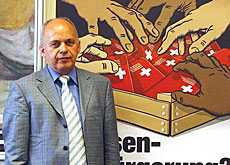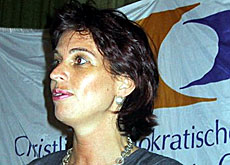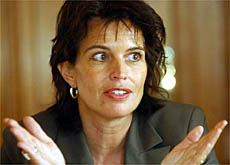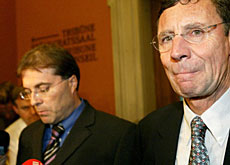Christian Democrats face up to reality

Following their trouncing in last year’s parliamentary elections, the centre-right Christian Democrats are seeking to reinvent themselves.
Their new president, Doris Leuthard, told swissinfo that the party would win back voters by taking a clear stance on issues which are being ignored by others.
Leuthard, 41, took over officially on September 18, after leading the party as interim president since December.
Her predecessor, Philipp Stähelin, stepped down following the Christian Democrats’ poor showing in last October’s parliamentary elections, when they received just 14 per cent of the vote.
A further blow came in December’s cabinet elections, with the loss of one of their two seats to Christoph Blocher of the rightwing Swiss People’s Party, leaving them the weakest of the four parties in Switzerland’s power-sharing government.
Their troubles stem largely from a polarisation of Swiss politics, which has seen voters desert the centre in favour of the People’s Party and the centre-left Social Democrats.
swissinfo: Why did you accept the presidency of the party?
Doris Leuthard: [The party] had planned to elect a new president in February. At that time it would not have been an option for me, because I would have had to give up my job.
Then the party changed its approach, deciding that it would be ‘First the programme, then the candidates’. In the meantime we found a solution that allows me to keep my job.
swissinfo: Last December the Christian Democrats suffered a humiliating defeat when former justice minister Ruth Metzler was voted out of the cabinet. What has been done to deal with the consequences?
D.L.: The fact that Ruth Metzler was voted out of office can be explained by the rightwing Swiss People’s Party’s huge gain in votes. Two representatives of their party are now members of the cabinet. I am not sure that this was good for Switzerland considering the current situation. [Justice minister] Blocher is not being integrated [into the government].
What this means for us is that we need to be better – we need to have clear policies to convince people, and to raise our profile. And that is exactly what I aim to achieve with the party’s new programme.
swissinfo: Support for your party has been steadily falling in recent years. What are the Christian Democrats doing wrong?
D.L.: It is true that many of our [party] programmes have been rewritten. We have carried out an in-depth analysis of our strengths and weaknesses, with input from the grassroots, and this was widely supported. I believe we have now taken all our voters’ needs into account.
We are concentrating on three issues, rather than 15, namely – work, family and social security. Party unity – a much-discussed topic in the past few years – needs to be improved. We have a good basis for going forward, but hard work lies ahead.
swissinfo: The outcome of last weekend’s vote on easing citizenship rules shows how powerful the People’s Party has become. Even your last-minute appeal for voters to support the proposals had no effect. What went wrong?
D.L.: The People’s Party lost the vote on [introducing statutory maternity benefits] so it was not a victory for them: they won one and lost one.
The People’s Party is still very successful at stirring up and channelling people’s fears about foreigners and asylum policy so that they reject any loosening of the laws.
But we are also to blame because we did not manage to eliminate those fears. I hope that the Swiss will become more open-minded about foreigners in future.
swissinfo: How are you – as new party leader – intending to put your party back on track?
D.L.: [First], it is my job to put the programme into practice [and] to match words with actions. Success depends on keeping our promises and staying focused.
Second, parliamentarians represent a party. So we have to put them in the limelight more often. People easily forget that the Christian Democrats are in the majority in the senate. And I would like to encourage our senators to speak publicly about the good work they do, and I also wish the media would write about it.
And third, I will establish contact with the people. You have to take people seriously, listen to their concerns, so you can deal with their problems at a political level.
swissinfo: Nevertheless, the press is hardly impressed with the new party programme “Invigorating Switzerland”.
D.L.: The Christian Democratic Party has not done everything wrong with its programme. We don’t need a revolution – that wouldn’t suit us. We are not populists; we are not just hot air.
swissinfo: Why does Switzerland need a Christian Democratic Party?
D.L.: Because we strike a balance between economic and social policy, which is an important task and fundamental for a healthy state.
Having this balance has been beneficial to Switzerland so far. It is not the most desirable role, but it is the only way of maintaining peaceful labour relations and balancing the needs of city and the countryside, and so forth.
swissinfo: Parliament and government have shifted further to the right since last year’s elections. How can the Christian Democrats get their message across in parliament?
D.L.: We are the social conscience of the centre-right. And we are a centre-right party, because individual freedoms are our primary concern. But this doesn’t mean one can ignore one’s responsibilities to society. The Christian Democratic Party stands for the liberal social element within the centre-right alliance.
swissinfo: Do the Christian Democrats need to move right or left to gain more votes?
D.L.: That would be a mistake because it would leave us as a junior partner. The Christian Democrats have to stick to their own position.
swissinfo: The Christian Democratic Party calls itself the party of the family. But issues concerning the family are seldom discussed in parliament.
D.L.: Families have only a small lobby. There is no federal office for families, although there have been demands for one for a long time. Many issues concerning families are also relevant to other areas. We are convinced that doing something for the future means doing something for families.
swissinfo: What do you think should be done to improve the economic situation in Switzerland?
D.L.: [First], our goal must be to reduce bureaucracy. Small- and medium-sized businesses in particular are forced to waste too much time filling in VAT and social security forms.
Second, [we need to] bring down prices. Prices in Switzerland are 20 to 40 per cent higher than in the rest of Europe. We need more competition.
Third, regional policy is another area where we need to make progress. The regions, and the domestic market, are important pillars of the national economy. Instead of subsidising them, the state should rather invest in projects which create value.
swissinfo: Where do you stand on the issue of Europe?
D.L.: We will certainly support the [new] bilateral agreements [on closer ties with the European Union], as well as EU enlargement.
Opening up Switzerland will lead to new opportunities, both in economic terms by bringing down trade barriers, and in security terms by aligning ourselves more closely with the relevant organisations in the EU.
swissinfo: What about Switzerland becoming a member of the EU?
D.L.: If we manage to convince the electorate to approve the bilateral agreements, then it will be time to start discussing membership. Either route is possible – both have advantages and disadvantages.
swissinfo: How important is Switzerland’s image abroad?
D.L.: It is of vital importance, of course, because our economy is an export economy. We live and depend on trade with foreign countries, so it is vital for us to point out our strengths and to be proud of them.
Switzerland should be more self-confident and should stop always focusing on its own problems. In comparison with the problems in much of the world, we really don’t have that much to worry about.
swissinfo: How important are the Swiss abroad for you?
D.L.: I consider it an advantage that they allow us to view our country from a different perspective. It often provides stimulus to improve situations and things.
swissinfo-interview: Christian Raaflaub
Doris Leuthard, 41, is a lawyer and parliamentarian.
She was elected president of the Christian Democratic Party on September 18, 2004.
She has been interim president since Philipp Stähelin stepped down last December.

In compliance with the JTI standards
More: SWI swissinfo.ch certified by the Journalism Trust Initiative













You can find an overview of ongoing debates with our journalists here . Please join us!
If you want to start a conversation about a topic raised in this article or want to report factual errors, email us at english@swissinfo.ch.